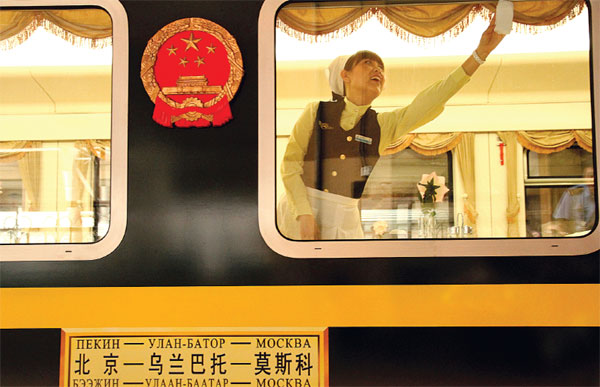

A proposed high-speed rail linking Beijing and Moscow is among many transnational transport projects that may hasten tourism development. Yang Feiyue reports.
Tourism between China and Russia is about to accelerate since a 7,000-kilometer, 1.5 trillion yuan ($245 billion) high-speed rail under consideration will cut travel time between Beijing and Moscow from six days to two, the Beijing Information Office says.
"The high-speed train will give tourists another option and bring more visitors to China," says Jiang Yiyi, director of the China Tourism Academy's International Tourism Development Institute.

|
Top and above: It takes six days to travel on train from Beijing to Moscow. The newly planned high-speed rail will cut the time to two days. Photos by Hong Yu / For China Daily |
It will run through Kazakhstan and likely boost tourism among countries along the ancient Silk Road, especially Central Asian nations, she says.
More than 2 million Russians visited China last year. Most were from the country's easternmost areas, National Public Opinion Poll Lab chief analyst Liu Zhiming says.
"The high-speed rail will make it more convenient for them to explore China," Liu says.
An advantage over the nine-hour direct flight between the capitals is the train affords such scenery as primitive forests, lakes and wetlands, Jiang says.
Rail transport affords greater capacity than air travel and can deliver bulk cargo, too, experts point out.
The rail is expected to significantly profit China and neighbors by enhancing exports to western Asia and Europe while reviving the Silk Road, experts say.
China has more bordering countries than any other. And travel among countries reduces international tensions, says Zhang Guangrui, honorary director of the Tourism Research Center at the Chinese Academy of Social Sciences.
The rail's benefits to cooperation will be long term, Zhang writes in the China's Tourism Development: Analysis and Forecast (2014-15), the Tourism Research Center's annual green paper.
The report points out that the Beijing-Moscow high-speed rail and other forthcoming transport projects, such as a circuit railroad across South Korea, Russia and Mongolia, promise to enhance tourism. Other proposals include a northeastern-Asia rail, road and sea transport passage, and land transport connecting China with western and southern Asia.
Money will be the Beijing-Moscow rail's biggest hurdle, Chinese Academy of Engineering academician Wang Mengshu says.
Wang says the construction costs are astronomical, adding that it will take five years to complete the rail once the investment is lined up.
China typically provides investment, technology and equipment to build transnational high-speed railways and assists post-construction operations, Wang says.
It participated in building Turkey's Ankara-Istanbul high-speed rail, which went into service in July.
It signed a memorandum of understanding with Russia in October and will bid on the Moscow-Kazan rail.
China also signed a $12 billion coastal rail project with Nigeria's transportation authority in November. And it has announced intentions or signed memorandums with the United Kingdom, India, Laos, Thailand, the United States and Brazil.
China's high-speed rail development has transformed domestic tourism. Travel time between Beijing and Shanghai has been cut by five hours. It now takes only nine hours to travel from Beijing to Guangzhou.
This facilitates previously impossible weekend trips, Jiang says.
Contact the writer at yangfeiyue@chinadaily.com.cn